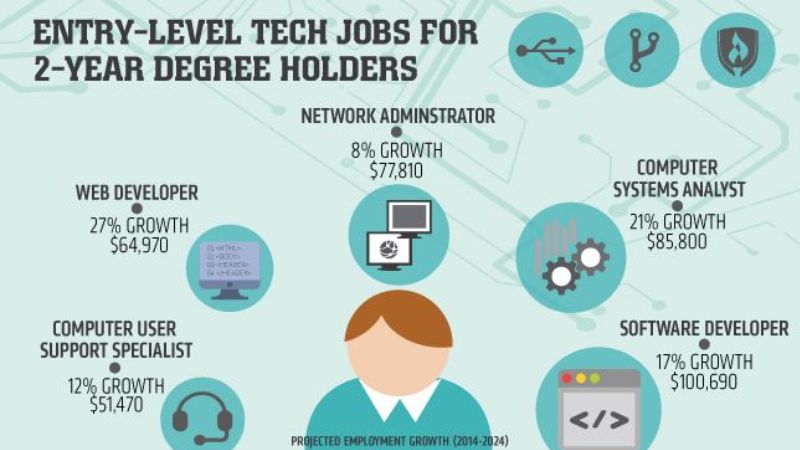Introduction
Starting in the world of technology may be a door to a field that is craving for reason, imagination, and great opportunities. Introductory-level information technology occupation is a springboard that acts as a career climax for young people seeking to step into a dynamic field and pursue turbo-charged and impact careers. This guide will focus on different entry level technology jobs, find out what they call for to advance your career in the tech field, and give you valuable tips to be hired.
Exploring Entry Level Technology Jobs
Entry level technology jobs provide different job opportunities in different fields, which cover people with different interests, skills, and ambitions. You don’t need to be a computer science guru to benefit from a career in IT; you just need to have a passion for computer science, programming, cybersecurity, data analysis, or project management.
Software Developer
The role of a software developer is to design, develop, and, test software applications in a way that they become satisfactory to users and business organizations. Coding and debugging are usual responsibilities of entry-level roles and partnerships with multi-discipline teams to build the best software are expected.
Data Analyst
Data analysis professionals have an important part in revealing insights from data that are crucial for decision-making and strategies. In non-managerial positions, you will need to process data sets, sort, and analyze them, prepare printouts, and display data visually to reveal trends and patterns.
IT Support Specialist
The IT support specialists offer technical assistance and troubleshooting solutions if users are experiencing some problems with hardware or software. The points of entry are engaged in instantly analyzing issues, actively supporting or doing on-site support, and in charge of monitoring the operations of the IT systems and networks.
Cybersecurity Analyst
Cybersecurity experts shield organizations’ technology assets from data theft and defects by discovering and preventing illegal attacks. Newcomers to such tasks care about keeping for example the network traffic under control, analyzing logs, and implementing proper security protocols as protection against cyber attacks.

Skills Required for Success
While some skills may vary according to the position and the industry where the person is working, the following competencies are basic requirements for success in an entry level technology jobs.
Technical Proficiency
The knowledge of the programs, analysis of data, and IT systems involved in your career field will be an added advantage. Being constantly striving to improve your technical skills by practicing, writing code on the internet, and developing it can enable you to deal effectively with your job and gain employability.
Problem-Solving Abilities
The skills to locate the problem, identify the cause, and provide fitting solutions are very much considered good qualities to have in the tech industry. Build your analytical prowess by taking on complicated tasks and replacing inferiority complexes with a problem-solving spirit with the help of mentorship.
Communication Skills
Effective communication is key to working with teammates, and non-technical stakeholders, and providing customer support. Enhance writing skills, presentation techniques, and oral communication strategies to facilitate clear and concise communication.
Adaptability and Learning Agility
The IT field is constantly changing, with new systems, tools, techniques, and industry trends frequently emerging, thus, professionals should be ready to change rapidly. Have an appetite for being a lifelong learner, keep up with the updates in the democratic set of technologies, and accept training and developing yourself for a long-length career.
Landing Your Dream Job
Although landing an entry level technology jobs needs a mix of preparation, persistence, and networking, simply be strategic to increase the odds.
Build a Strong Foundation
Put to get the necessary skills and knowledge through formal education, online courses, and practical experiences such as internships and freelance projects. Develop a portfolio that demonstrates what you have done and indicates your capabilities to either show it to or impress future employers.
Tailor Your Resume and Cover Letter
Create a perfect resume and cover letter, in which you showcase your related skills, experience, and achievements. Tailor your application supplies according to each position make sure they relate to the job description and add your unique value to the employer as the candidate.
Network Effectively
One of the best ways to network with professionals in the tech industry is by engaging in online mediums, industry occasions, and professional associations. Seek out personal interactions, consult advisors, and use informational interviews to develop your network and discover the off-market job prospects.
Prepare for Interviews in Entry Level Technology Jobs
Research the company and the job position thoroughly, learning about the company, as well as the products and services it offers, and industry standards. Work on answering common interview questions, speak up about your skills and experiences, and show your drive towards technology and eagerness to learn.



